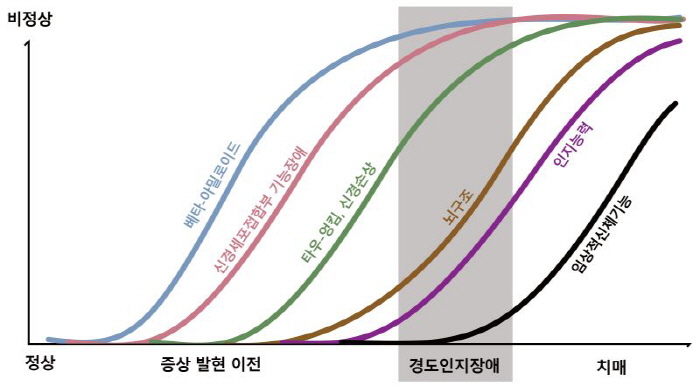A Simple Blood Test Can Predict Alzheimer's Dementia Risk
Apr 01, 2025
The possibility of early screening for Alzheimer's disease with a simple blood test is increasingly approaching.
Dementia is a serious health problem around the world, and Korea is also interested in dementia and mild cognitive impairment, which is a previous stage due to rapid aging.
In particular, the number of patients with mild cognitive impairment among the elderly over 65 is expected to surge from 1.96 million in 2016 to about 3 million this year, showing a steeper increase than the prevalence of dementia.
Studies have also reported that 10-15% of patients with mild cognitive impairment progress to dementia every year, so early diagnosis is of paramount importance.
Recently, with the emergence of treatments that slow the progression of Alzheimer's disease, the dementia management paradigm has shifted to diagnosis and prevention.
Since these treatments target patients with mild cognitive impairment and early Alzheimer's disease, early diagnosis is essential.
In particular, the importance of early prediction before symptom onset is increasing, and early diagnosis technology of Alzheimer's disease through blood tests is drawing attention.
In 2023, the National Institute of Aging and Alzheimer's Association designated amyloid beta 42 (Aβ42) as a key biomarker for early diagnosis.
Amyloid beta accumulates in the brain 10 to 20 years before the onset of Alzheimer's disease, and Aβ42 has been found to play an important role in this process.
Positron tomography (PET) or cerebrospinal fluid tests are required to confirm amyloid accumulation, which is currently a biomarker for Alzheimer's disease.
However, these tests are time-consuming and expensive, and in particular, cerebrospinal fluid tests have required non-invasive and efficient alternatives due to pain in patients.
Blood tests can be evaluated comprehensively even in a limited environment, which is expected to reduce dependence on PET or cerebrospinal fluid tests and increase access to early diagnosis.
"The Aβ42/Aβ40 blood test is a useful predictive tool to determine the risk of dementia in advance, and provides the basis for systematically maintaining and managing brain health through regular monitoring tests," said Oh Jong-won, vice president of the SCL (Seoul Institute of Medicine).
If the alert level is confirmed, the possibility of preventing dementia or slowing down the progression through lifestyle control is also suggested.
Sufficient sleep, regular physical activity, balanced diet, brain activity, etc. can help reduce amyloid beta accumulation and remove already accumulated substances. Ultimately, it is expected to play an important role in reducing the burden of national medical expenses in connection with the government's dementia policy.
Dementia is a serious health problem around the world, and Korea is also interested in dementia and mild cognitive impairment, which is a previous stage due to rapid aging.
In particular, the number of patients with mild cognitive impairment among the elderly over 65 is expected to surge from 1.96 million in 2016 to about 3 million this year, showing a steeper increase than the prevalence of dementia.
Studies have also reported that 10-15% of patients with mild cognitive impairment progress to dementia every year, so early diagnosis is of paramount importance.
Recently, with the emergence of treatments that slow the progression of Alzheimer's disease, the dementia management paradigm has shifted to diagnosis and prevention.
Since these treatments target patients with mild cognitive impairment and early Alzheimer's disease, early diagnosis is essential.
In particular, the importance of early prediction before symptom onset is increasing, and early diagnosis technology of Alzheimer's disease through blood tests is drawing attention.
In 2023, the National Institute of Aging and Alzheimer's Association designated amyloid beta 42 (Aβ42) as a key biomarker for early diagnosis.
Amyloid beta accumulates in the brain 10 to 20 years before the onset of Alzheimer's disease, and Aβ42 has been found to play an important role in this process.
Positron tomography (PET) or cerebrospinal fluid tests are required to confirm amyloid accumulation, which is currently a biomarker for Alzheimer's disease.
However, these tests are time-consuming and expensive, and in particular, cerebrospinal fluid tests have required non-invasive and efficient alternatives due to pain in patients.
Blood tests can be evaluated comprehensively even in a limited environment, which is expected to reduce dependence on PET or cerebrospinal fluid tests and increase access to early diagnosis.
"The Aβ42/Aβ40 blood test is a useful predictive tool to determine the risk of dementia in advance, and provides the basis for systematically maintaining and managing brain health through regular monitoring tests," said Oh Jong-won, vice president of the SCL (Seoul Institute of Medicine).
If the alert level is confirmed, the possibility of preventing dementia or slowing down the progression through lifestyle control is also suggested.
Sufficient sleep, regular physical activity, balanced diet, brain activity, etc. can help reduce amyloid beta accumulation and remove already accumulated substances. Ultimately, it is expected to play an important role in reducing the burden of national medical expenses in connection with the government's dementia policy.
|
This article was translated by Naver AI translator.














